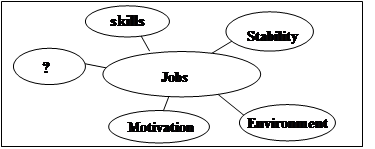题目内容
A good driver ________ the speed of his car according to the condition of roads.
- A.increases
- B.varies
- C.reduces
- D.exchange

Have you ever picked a job based on the fact that you were good at it but later found it made you feel very uncomfortable over time? When you select your career, there's a whole lot more to it than assessing your skills and matching them with a particular position. If you ignore your personality, it will hurt you long-term regardless of your skills or the job's pay. There are several areas of your personality that you need to consider to help you find a good job. Here are a few of those main areas;
1) Do you prefer working alone or with other people?
There are isolating(使孤立)jobs that will drive an outgoing person crazy and also interactive jobs that will make a shy person uneasy. Most people are not extremes in either direction but do have a tendency that they prefer. There are also positions that are sometimes a combination of the two, which may be best for someone in the middle who adapts easily to either situation.
2) How do you handle change?
Most jobs these days have some elements of change to them, but some are more than others. If you need stability in your life, you may need a job where the changes don't happen so often. Other people would be bored of the same daily routine.
3) Do you enjoy working with computers?
I do see this as a kind of personality characteristic. There are people who are happy to spend more than 40 hours a week on a computer, while there are others who need a lot of human interaction throughout the day. Again, these are extremes and you'll likely find a lot of positions somewhere in the middle as well.
4) What type of work environment do you enjoy?
This can range from being in a large building with a lot of people you won't know immediately to a smaller setting where you'll get to know almost all the people there fairly quickly.
5) How do you like to get paid?
Some people are motivated by the pay they get, while others feel too stressed to be like that. The variety of payment designs in the sales industry is a typical example for this.
Anyway, these are a great starting point for you. I've seen it over and over again with people that they make more money over time when they do something they love. It may take you a little longer, but making a move to do what you have a passion for can change the course of your life for the better.
【小题1】Which of the following is TRUE according to the passage?
| A.Isolating jobs usually drive people mad. |
| B.Interactive jobs make people shy easily. |
| C.Extreme people tend to work with others. |
| D.Almost everyone has a tendency in jobs. |
A. Before you select your job, you should assess your skills and match them with your position
B. There are more important things than assessing skills and match them with the position when you select job.
C. Nothing is important than assessing skills and match them with the position when you select job.
D You should ignore your skills when you select job.
【小题3】What is the missing word about a job search in the following chart?

| A.Design. | B.Changes. | C.Cooperation. | D.Hobbies. |
| A.Lifestyles and Job Pay | B.Jobs and Environment |
| C.Job Skills and Abilities | D.Personalities and Jobs |